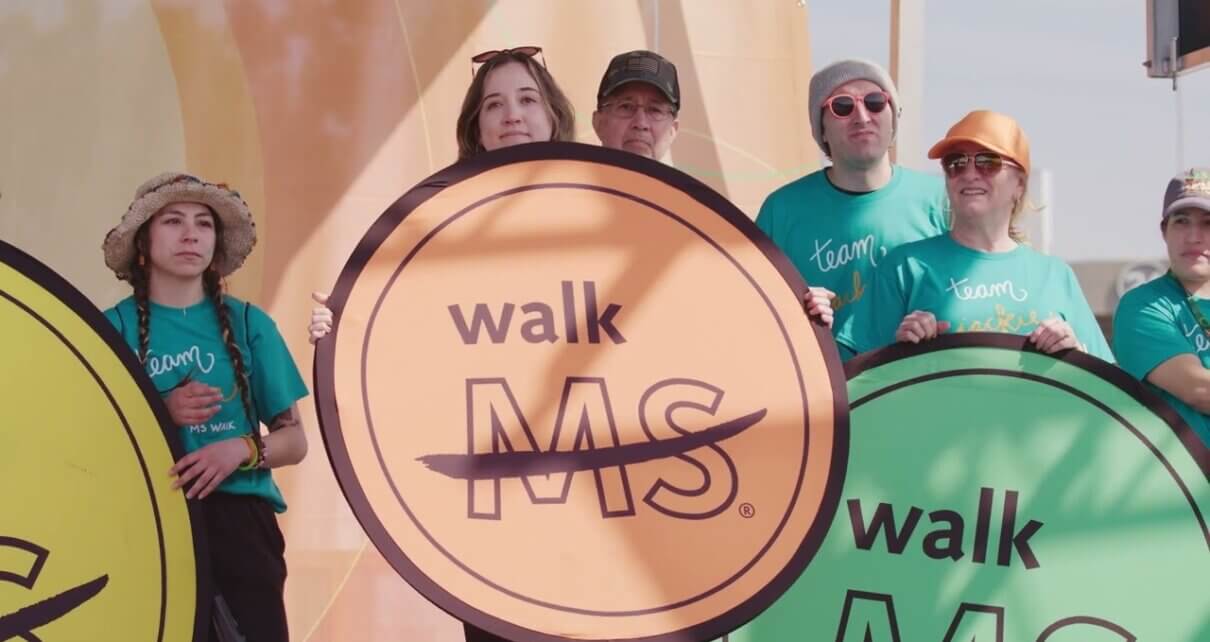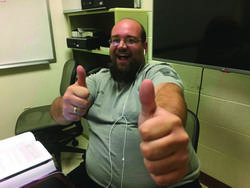In my previous article, I wrote about the MS walk and all the hard work that we are doing in the Service Learning program in order to fight against Multiple Sclerosis. While we are doing our best to help the cause, it is just as important to understand why we are doing it. After my uncle’s diagnosis in 2001, he has fought the disease for 23 years now, and to me, he is the biggest reminder as to why this work is very important. My uncle was generous enough to allow me to interview him, and was eager to spread awareness about the disease he has fought so hard against.
My uncle, Bill Liddy, was diagnosed at age 37, and initially, doctors thought he had a brain tumor, so when it turned out to be Multiple Sclerosis, it came with a sense of relief. However, the diagnosis was still a confusing one, because not many people knew about the disease. With the diagnosis, there comes plenty of learning about the disease because people back then and still today, do not really know what the disease is. Following his diagnosis, he had to find a doctor who could treat him, which was a neurologist who could give him new medications. He was told early on that because they had caught it early, that nothing that bad would ever happen to him. While my uncle knew there was no cure, the harsh reality of the disease, was that MS only progresses and gets worse.
After his diagnosis, my uncle went on to change his diet and work schedule because he had been working nights as a cop. This was an effort to minimize stress and take care of himself as much as possible. These kinds of life changes, along with help from his doctors, allowed the disease to lay dormant for almost over a decade, despite some right hand, foot and knee sensations.
In 2013, 12 years after his initial diagnosis, he began having flare ups again which affected his vision, then another 4 years later came with more flare ups. Each flare up would cause him to go into “relapsing and remitting” where the symptoms would affect him for a week and then go away. Twenty-three years later, my uncle is in a stage which they call secondary progression, where his symptoms affect him every day and are noticeable. These symptoms are what doctors call smoldering. My uncle said, “These symptoms will never go away and the parts that are affected are going [continue being] affected.”
There are many ways in which this disease has physically altered his life. Due to the physical toll it has taken on his body, it has hindered this lifestyle as well. When asked about the ways this disease changed his life the most, he described himself as a doer, but now he has a hard time doing the things he once loved.
He said that despite being in Florida, he couldn’t go golfing or go fishing, which are staple activities of the state. He also said, “Nothing is easy anymore. I always played softball and if I was normal I’d still be playing, but those days are over.” With all this considered, MS doesn’t stop him from building a nightstand and coffee table for his daughter’s new apartment. It also doesn’t mean that he can’t assemble the bed that she uses every night. While this disease might take away activities he might have loved in the past, he is the kind of person who no matter how deep he is stuffed in a corner, will always try to fight his way out, no matter the odds. He described himself as a doer, and despite this disease, some things never change.
Due to the Service Learnings’ close ties to the National MS society, I wondered in what ways the MS society had affected my uncle’s life, if in any way at all. He said that he views the MS society as a great source of information for people who have the disease. The MS society has provided diet and exercise information, as well as a newsletter that they send to him, which he loves to read. He likes knowing that there is a foundation raising awareness and donations for those fighting the disease.
The MS society provides positive insight on the disease, as well as stories of people who have overcome the challenges that come with MS. When asked about the MS walk, which we have done as a family, he said it was a great experience. It was good for him to see so many people out and focused on MS. He feels as though MS does not get much national spotlight, so the walks shines light on the efforts of so many people to help. MS did not have the attention that it does now when he was first diagnosed, and the walk allows people to provide awareness and spread morale. Overall, he views the national MS society as a very positive resource and foundation that helps people with MS every day.
The topic of MS is obviously a grim one. My uncle talked about touchy subjects and sensitive things, and it’s easy to view it all as negative. Despite the challenges that MS causes in his life, he is a fighter. This disease gives you no choice, but not everyone has to fight as hard as he does. He has fought for 23 years, and I hope to see him fight for 23 more. No one wants to see a loved one like that. Yet, this man still builds furniture, goes on vacations, attends all family parties, and even mows his lawn. Seeing a person who has every right to give up continue to fight is sometimes all of the inspiration a person needs to fight with him.
The Service Learning program and the National MS Society has allowed me to raise money, spread awareness, show support, and most importantly, show my uncle that although we might not have the disease, we are still fighting with him. He is an easy reminder for why we do this work, and why we will continue this work until we find a cure.




